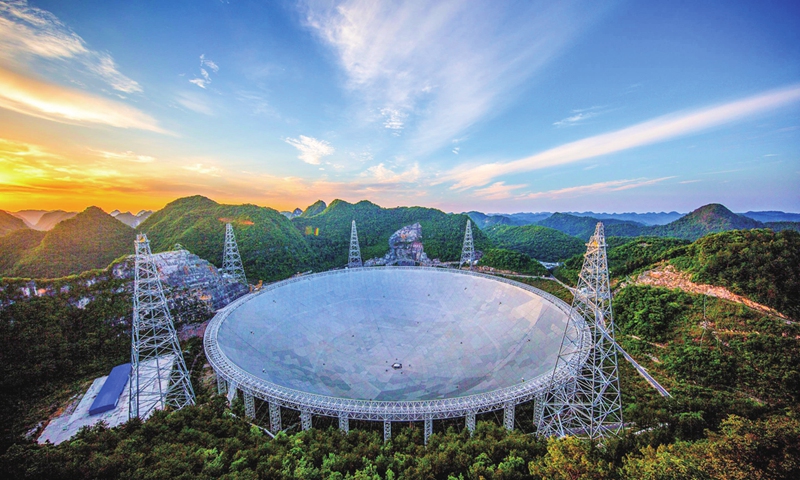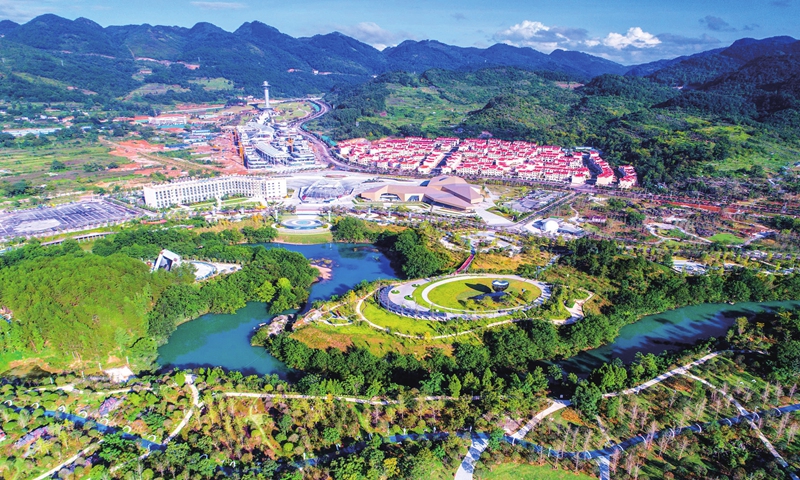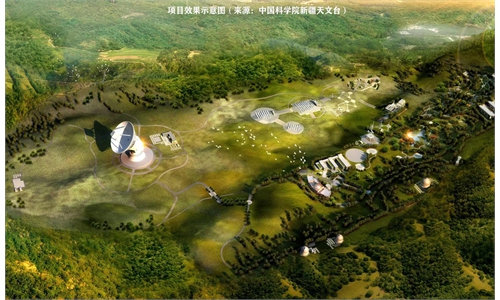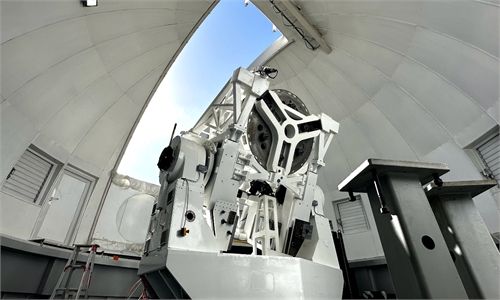China’s FAST boosts tourism, income in astronomy-themed town
China’s giant radio telescope lures travelers, improving local livelihoods

An aerial view of the 500-meter Aperture Spherical Radio Telescope (FAST) in Pingtang county, Southwest China's Guizhou Province Photo: courtesy of FAST
"We receive about 400 visitors every day during weekdays and up to 2,000 visitors in weekends," a tour guide surnamed Wang told the Global Times on Tuesday at the observatory for the 500-meter Aperture Spherical Radio Telescope (FAST), also known as the "Eye of the Sky" in Pingtang county, Southwest China's Guizhou Province.
Kedu, the so-called "astronomy town" in mountainous Pingtang, which is five kilometers from the giant telescope, has developed into a tourism destination. Visitors who love astronomy come to experience the charm of FAST.
"Boosted by local geological wonders and folk custom, Kedu offers multiple travel routes, which can arouse visitors' curiosity, help them explore the universe, and enable them to view Guizhou's karst landforms and experience local ethnic culture," said Wang.
Many naturally formed pits and karst caves are located in Guizhou, and FAST was constructed on a naturally karst depression site in Pingtang, which saved 3 billion yuan ($427 million) in excavation costs, according to Wang.
Hot destination
Wu, a 70-year-old, is traveling with his wife and their 3-year-old grandson in Pingtang, hoping to stimulate the child's interest in astronomy and science, and at the same time they could get a first glimpse of the giant telescope.
"We drove all the way from Hunan Province in Central China, and then to Guangxi, Yunnan and Guizhou. It's been three months since we began our self-driving tour," Wu told the Global Times on Tuesday at the Pingtang International Experience Planetarium.
The planetarium is part of the "Eye of the Sky" science base, including some museums about astronomy.
The Wu family experienced how the radio telescope works at a FAST simulation room at the planetarium by operating a tablet computer. The FAST system actively adjusts the attitude of the reflecting surface and the feed cabin, receiving, processing and analyzing electromagnetic waves, and generates data for storage and transmission.
"China's technological progress is impressive. I'm proud of our motherland!" said Wu.
FAST is the world's largest and most sensitive single-aperture spherical radio telescope. According to official data, it had discovered more than 740 new pulsars by February, greatly expanding the boundaries of human observation of the universe.

An aerial view of Kedu town, dubbed as "astronomy town" in Pingtang county, Southwest China's Guizhou Province Photo: courtesy of FAST
Benefits for all
"Our family now earns about 100,000 yuan ($14,200) every year after opening our own guesthouse in Pingtang," a hotel owner in Kedu surnamed Xu told the Global Times on Tuesday.
Xu was among about 10 families who were relocated by the local government from the site of FAST to Kedu, as electromagnetic interference should be avoided within a 5-kilometer radius of the telescope. Electronic devices like cellphones cannot be brought near FAST.
Xu transformed the compensatory housing in Kedu into a hotel. "Our annual income was only 10,000 yuan from planting corn before the telescpe started construction in 2011."
"There are no empty rooms left during the summer, while rooms are almost fully booked during holidays. As far as I know, more than 10,000 visitors come to Kedu every day during summer vacation and holidays," said Xu.
So far, the "Eye of the Sky" science base has received 2.8 million visitors with revenue of 218 million yuan, according to media reports.
There are now more than 30 hotels and 80 restaurants in the astronomy town, having created over 1,200 jobs, the Global Times learned.
"Local people have benefited a lot from FAST. First, their income has increased. Second, the environment is cleaner," said Xu, noting that the local government has built kindergartens, primary schools and middle schools in Kedu, which makes it more convenient for children to go to school.
Magic bridge
The local government has built villas and leased them to relocated villagers, making it easier for them to operate the villas as homestays and increase their incomes.
Apart from building infrastructure that improves local livelihoods, Pingtang has rebuilt and broadened more than 200 kilometers of roads for tourism and built eight new sightseeing platforms to attract tourists.
The Pingtang Bridge, known as "Sky Bridge" surrounded by cloud and fog all year round, was one of the efforts to make Pingtang easier to access.
The tallest bridge tower is 332 meters high, which is the tallest concrete bridge tower in the world, Luo Chihao, director of the Sky Bridge scenic area under the Guizhou Highway Development Co, told the Global Times.
"The bridge was opened to traffic in December 2019, which shortened the road journey between Pingtang's Tongzhou town and Yazhou town from 48 minutes to just 3 minutes," said Luo.
"The road trip to Guiyang (capital of Guizhou) was shortened to two-and-a-half hours from six hours," Luo added.
"Thanks to improved transport, incomes of local farmers have increased significantly. A huge plantation, about 10,000 mu (667 hectares), with 38 kinds of fruit, was built in the valley right under the bridge," said Luo.
A farmer surnamed Liu, who has her own land in the fruit plantation in the valley under the Pingtang Bridge, is one of the locals who have benefited from the improved transport.
"In the past, there were few businessmen who came to collect our fruits, as the transportation from Pingtang to Guiyang was difficult. But after the bridge was built, everything has changed," Liu told the Global Times on Wednesday.
She noted that local farmers now run e-commerce stores and directly ship their products around China, or even export local produce faraway to South Korea and Japan.
"Now, we have earned more money and our life is better," said Liu.
The Sky Bridge scenic area alone has created 50 jobs for local people. A new motorhome camp is under construction and will be put into use in July for a beer festival, which will attract more tourists from all over the country and the world, Luo said.



